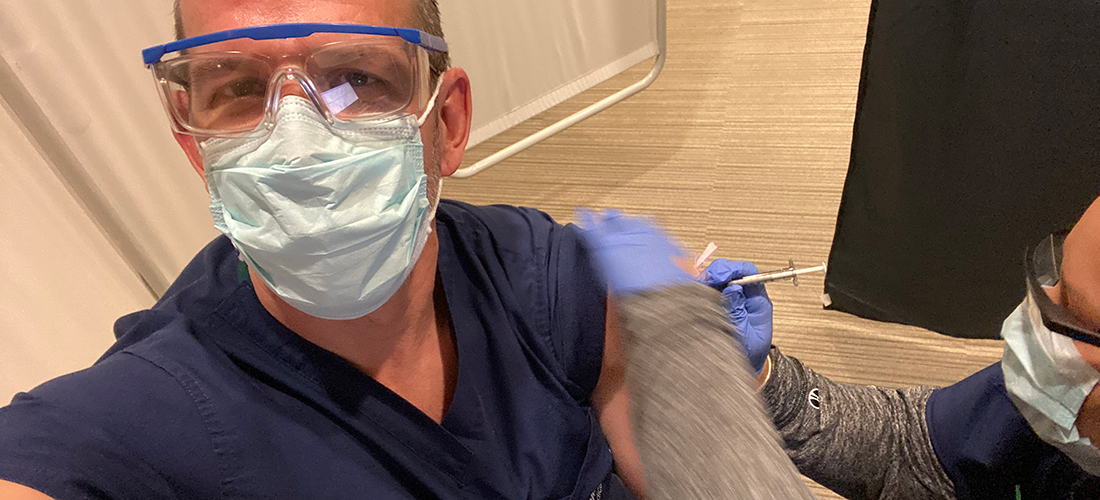How Periop Nurses and AORN Have Taken On COVID-19
By: Aorn Staff
Published: 8/26/2021
How Periop Nurses and AORN Have Taken On COVID-19

David Wyatt, PhD, RN, NEA-BC, CNOR, receiving Covid-19 vaccine.
David Wyatt, PhD, RN, NEA-BC, CNOR, had the unique experience of leading AORN’s national board in a most unusual year for the association. Yet, as he finishes his term as president, he’s focused on how adaptations have made the perioperative nursing profession and AORN stronger.
“It’s truly an honor to lead through this incredibly challenging time,” says Wyatt, who is chief nursing officer of the University Hospitals at the University of Texas Southwestern Medical Center in Dallas. “I’m proud of the ways AORN has pivoted and engaged our members and partners in the perioperative community.”
He shared reflections on leadership, flexibility, and diversity in a recent interview.
COVID cases spiked just as you were starting your term as president. How did you, the board, and AORN’s headquarters’ team react?
We knew we had to do what we could to prepare the nurse leaders for the challenges they were facing in their facilities. And we needed to continue to guide all perioperative nurses through the changing guidance and new expectations of their employers and colleagues.
We started with a careful review of infection prevention and policies to develop educational materials that were more specific to COVID safety. Within one week of the WHO declaration that this was, indeed, a pandemic, AORN posted a COVID-19 Resources and Toolkit to our website and immediately began pushing the safety recommendations to our members through Periop Today, the AORN Journal, and on the AORN social channels. We also produced several virtual town halls for members about COVID safety which were seen by thousands and AORN was among the first nursing associations to do this.
Several joint statements were created to safely guide surgical teams through the cancellation and then reinstatement of elective surgeries. Partnerships with the American College of Surgeons, American Society of Anesthesiologists, and the American Hospital Association led to recommended processes and procedures for safe and effective management.
There often was contradictory information at the federal level. We believe AORN demonstrated its resilience and its value as a critical resource for members who needed immediate and clear guidance.
What special qualities did you see in perioperative nurses because of the COVID situation?
Facilities turned to perioperative nurses for their expertise in donning and doffing as well as their knowledge of patient positioning. Nurses in the ICU and emergency departments were able to develop a greater level of competence in patient care and personal safety because the perioperative nurses helped them hone their skills.
As perioperative nurses are most frequently working behind the “double doors” their colleagues learned through COVID experiences that we are team players and experts in our practice. We saw the breakdown of hierarchies and more effective teamwork across the specialties.
One of the other intertwined themes of the past year has been social justice and inequities, including in healthcare. How did that influence your term?
Specific events like the murder of George Floyd, as well as the ongoing impact of COVID on communities of color, shed a stronger light on our society’s inequities in staffing and patient care. In June, we embarked on a comprehensive exploration of our values within the AORN organization and our membership. This led us to identify several areas of influence and opportunities to affect change to decrease disparities. Our strategic goals for 2021 and our revised Values statement reflect this commitment. Going forward, our members will see continued efforts to support diversity, inclusion and equity in staffing decisions and patient care.
It’s our hope that perioperative nurses understand the value of diversity in improving patient outcomes and their ability to influence change.
What do you see in the future for perioperative nurses and AORN?
Perioperative nurses will need to remain flexible and resourceful as they continue to work according to new policies and practices as they pertain to the safety of their patients, team members, and themselves.
The future calls for the resiliency of nurses and for AORN to remain innovative as we provide accessible resources to support our members’ practice.
Wyatt will be speaking at the upcoming Periop Reset event on Saturday, April 24. Join your perioperative peers as they reenergize, refocus, and renew at this virtual one-day event where we’ll be celebrating what we’ve achieved in the past year and where the perioperative profession goes from here.

